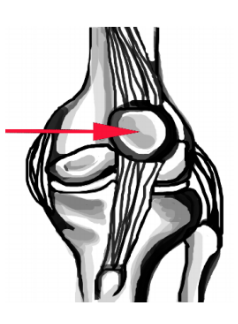Knee Injuries: Patella Dislocation

X-ray Views
- AP knee
- Lateral knee: Best to assess for displacement
- Patella view: Sunrise or Merchant view
Acute Management
- Closed reduction
- Splint in above-knee plaster cast (from distal 2/3s of thigh to MTP foot joints), straight leg immobilizer, or hinged knee brace
- Weight-bearing as tolerated with crutches
Follow-up Timing
- Within 1-2 weeks
- Consider sooner follow-up to assess for associated osteochondral fractures and medial patellofemoral ligament injury, which may require operative repair.
Notes
- Most managed non-operatively
- Complications: Recurrent dislocations
References
- Schwartz A. Patella Fractures Treatment & Management, Emedicine.com (June 2016) [Source].
- Hinton RY, Sharma KM. Acute and recurrent patellar instability in the young athlete. Orthop Clin North Am. 2003 Jul;34(3):385-96. [PubMed]
- Ji G, et al . Surgical versus Nonsurgical Treatments of Acute Primary Patellar Dislocation with Special Emphasis on the MPFL Injury Patterns. J Knee Surg. 2016 Sep 14. Epub ahead of print. [PubMed]
- Petri M, et al. Current Concepts for Patellar Dislocation. Arch Trauma Res. 2015 Sep 1;4(3):e29301. [PubMed]
- Medina O, et al. Vascular and nerve injury after knee dislocation: a systematic review. Clin Orthop Relat Res. 2014 Sep;472(9):2621-9. [PubMed]
